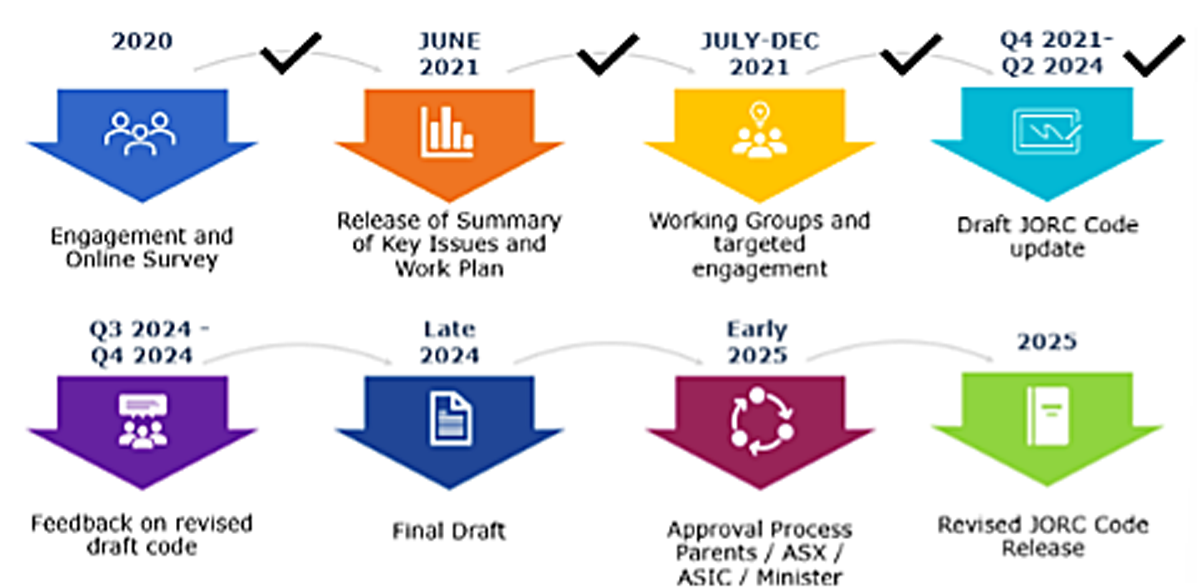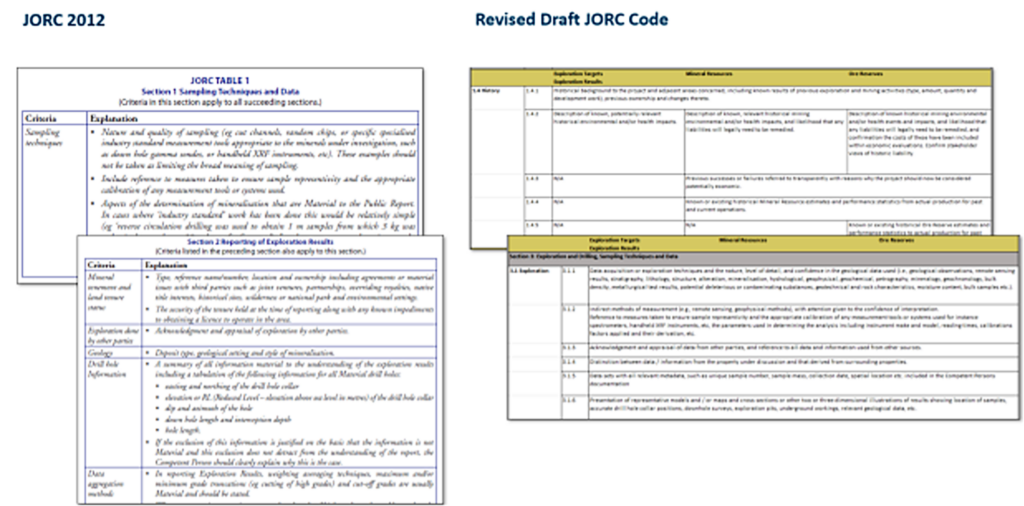GILES RAFFERTY, Corporate Communications and Media Advisor
The Australasian Joint Ore Reserves Committee (“JORC”) is looking to update the JORC Code to address issues with its application since it was last revised in 2012. The objective of the update is to maintain professional standards that will meet the evolution in governance requirements of the ASX, NZX and ASIC.
The JORC code was first introduced in 1989, when it was incorporated into the ASX listing rules, making compliance mandatory for listed companies. The Code was integrated into the NZX listing rules in 1992.
The JORC Code review process
The current JORC review process was initiated in 2020 and comprises several stakeholder engagement activities, (see Figure 1 JORC code update timeline progress). To date, the JORC committee has updated the code to reflect the results, in 2021, from a survey of opinions on improvements, contributions from key stakeholders, input from JORC Code Review Working Groups and a Joint Competent Person Taskforce.
Figure 1: JORC code update timeline progress
Overview of proposed changes
The current updated draft JORC code (“Draft Code”) is available to view by clicking here, and this blog aims to give and overview of some of the key changes.
The Draft Code contains changes to:
- Structure and format;
- Competent person requirements;
- Integration of ESG;
- Risk: opportunities and threats;
- Reasonable prospects;
- Reconciliation.
The changes should enhance application of the JORC committee’s governing principles of transparency, materiality and competence.
- Structure and format:
The Draft Code moves the existing guidance notes into a separate guidance note document. The high-level checklist of reporting and assessment criteria to be used, which makes up Table 1in the JORC code, has been updated to a three-column format, to align with international codes, (see Figure 2. Table 1 comparison JORC 2012 vs the draft JORC code.)
Figure 2: Table 1 comparison JORC 2012 vs the draft JORC code
- Competent Person Requirements
A Competent Person must be a member of a recognised professional organisation under the Code, with a minimum of five years’ of relevant experience working with the style of mineralisation or type of deposit being reported on. The Draft Code requires Competent Persons to upload, a publicly accessible, CV of Record on the JORC website and to be free from undue influence by the organisation or individual commissioning their work.
The Draft Code allows for Competent Persons to use subject matter experts to assist with reporting as long as they are qualified professionals with at least five years of contextual experience relevant to the project type being reported on.
- Integration of ESG
The Draft Code introduces ESG reporting, at all stages of an assessment, from exploration through to closure. The Draft Code makes provisions for Competent Persons to engage relevant subject matter experts to assist with ESG reporting.
The inclusion of ESG reporting aligns with the growing global emphasis on sustainability and appears to be designed to promote more responsible, sustainable and holistic reporting and business practices in the mining sector.
- Risks, Opportunities and Threats
The Draft Code requires businesses to disclose material risks, opportunities and threats with a narrow focus on the project stage being reported on.
Competent Persons will be required to report on the nature of material opportunities that have the greatest potential for positive effects on the relevant targets and what control measures are required to maximise outcomes. They will also have to report on the negative effects of the exploration targets, mineral resources or ore reserves and identify the nature of this threat; its potential impact and the control measures needed to mitigate it.
This requirement should result in more comprehensive risk assessments and better planning and risk mitigation.
- Reasonable Prospects for Economic Extraction
The Code requires a Competent Person to assess the factors that could impact the economic extraction of mineral resources. This assessment should be based on realistic and economically extractable mineralisation rather than all drilled or sampled mineralisation.
The JORC Code requires reports that show there are ‘reasonable prospects of eventual economic extraction’. The Draft Code does not include ‘eventual’ in this phrase, creating an expectation there will not be an open-ended timeframe to economic extraction.
- Reconciliation
The Draft Code tightens up reconciliation reporting by requiring a comparison of current estimates to prior estimates or actual production results. Where there are material differences between estimates and actual production results, explanations in plain English will need to be provided alongside a clear presentation of the reconciliation results. This more rigorous reconciliation processes should provide more reliable data on which to base investment decisions.
Stakeholder feedback
The JORC committee is now looking to gather feedback on this draft, from all stakeholders, by way of a 3 month, online survey that can be accessed by clicking here. The online survey was launched on the first of August 2024 and closes on 31 October 2024.
If the review process proceeds as planned, a final draft of the code is expected by the end of 2024, with a release date in 2025. Once the updated code is released there is an expectation that listed companies will have at least a 1-year transitional period to adapt to the new requirements before compliance becomes mandatory.

